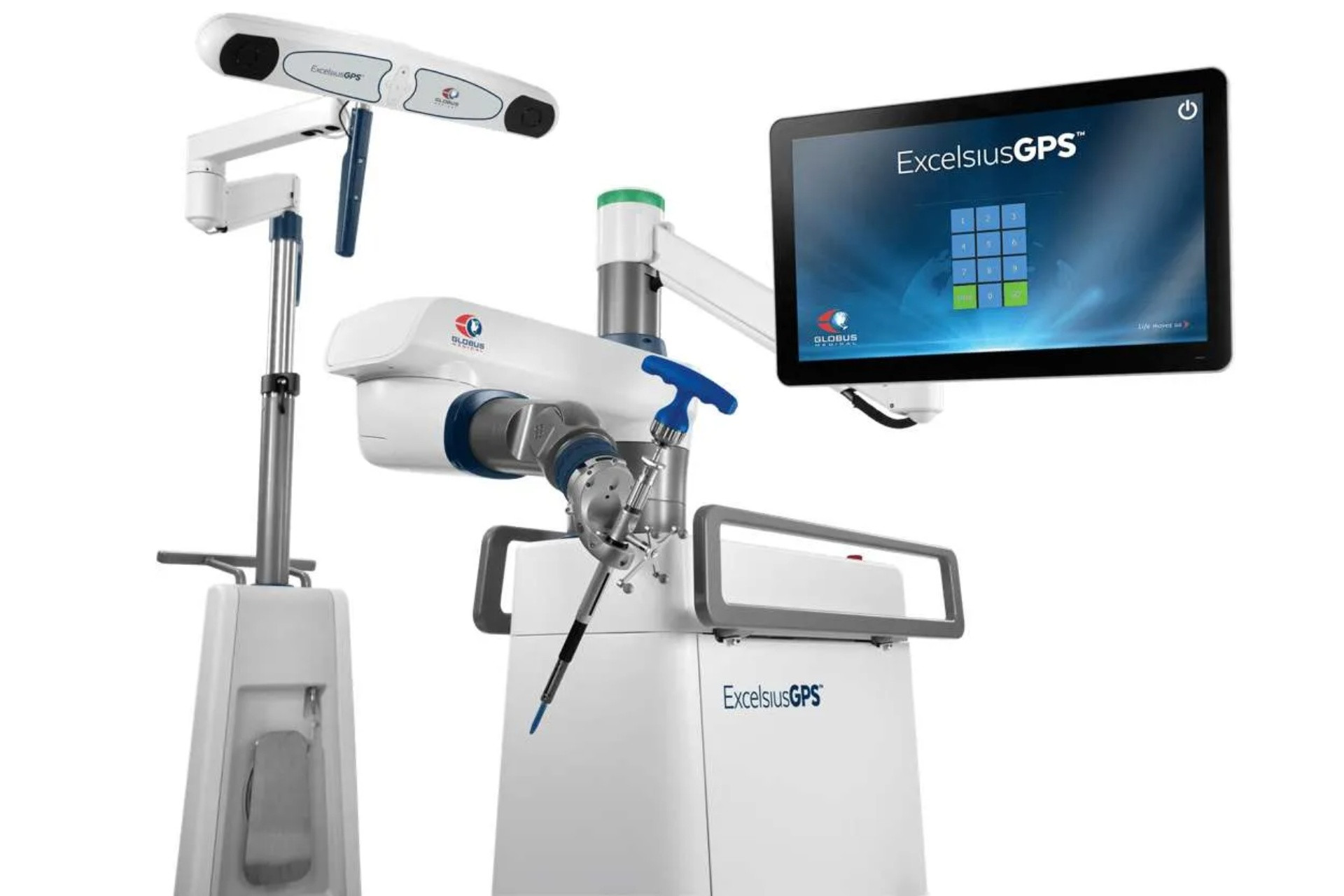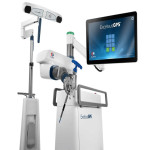The FDA today published a warning letter issued to Globus Medical (NYSE: GMED) alleging violations at a Pennsylvania facility.
Shares of Globus Medical — one of the largest orthopedic device companies in the world — fell more than 8% to $66.83 apiece in midday trading today. (MassDevice‘s MedTech 100 Index was up slightly.)
The warning letter, dated July 15, 2024, refers to an inspection of Globus Medical in Audobon, Pennsylvania. This inspection took place from Feb. 15, 2024, through March 7, 2024.
According to the FDA letter, the inspection centered around the company’s Excelsius GPS surgical robot and associated interbody spine and cranial modules.
In 2017, Globus Medical won FDA clearance for the Excelsius GPS robot-assisted surgery platform for spine. The system’s use includes locating anatomical structures and for the spatial positioning and orientation of an instrument holder or guide tube to be used by surgeons for navigating and/or guiding compatible surgical instruments in open or percutaneous procedures provided that the required fiducial markers and rigid patient anatomy can be identified on CT scans or fluoroscopy.
The FDA inspection revealed that the devices “are adulterated,” or not in conformity with current good manufacturing practice requirements. According to the agency, Globus Medical’s SVP of Quality Assurance and Information Technology, Daniel S. Paul, responded to FDA concerns in March and May of this year.
A look at Globus Medical’s alleged violations
The FDA said Globus Medical failed to establish and maintain procedures for implementing corrective and preventive actions. These include requirements for analyzing processes, work operations, concessions, quality audit reports, quality records, service records, complaints, returned product, and other sources of quality data to identify existing and potential causes of nonconforming product, or other quality problems using appropriate statistical methodology.
According to the FDA, Globus Medical provided data showing counts of misplaced screws per 10,000 screws implanted from 2017 to 2024. However, the agency alleges that the company used no additional level of data analysis with appropriate statistical methodology to identify trends. It expressed concerns over the firm’s risk evaluation methods with regard to the Excelsius GPS system.
The FDA also identified a failure to review, evaluate and investigate complaints involving the possible failure of a device to meet specifications. Specifically, the agency said Globus Medical failed to follow its product complaint procedure, which requires comprehensive complaint investigations.
According to the letter, the FDA saw a lack of details about how the company concluded there was no device malfunction or error in cases where the robot was in use when a patient experienced adverse health effects and passed away. Additionally, the FDA said there was a lack of evidence that the company made multiple attempts to verify a malfunction in a complaint that said a “screw missed pedicle which then went superior into the disc space and the screw was removed.”
More issues with Medical Device Reporting (MDR), FDA says
The FDA inspection also alleged that the Excelsius GPS devices are misbranded in that Globus Medical “failed or refused to furnish material or information respecting the device that is required by or under” the agency’s Medical Device Reporting (MDR) regulations.
Specifically, the FDA found a failure to submit a report to the FDA no later than 30 calendar days after the firm received or otherwise became aware of information that reasonably suggested that the device in question may have caused or contributed to a death or serious injury.
One complaint described an event in which a patient received damage to the dural lining of the spinal cord during a procedure. This instance necessitated surgical intervention and repair, the FDA said. According to the FDA, it saw no information reasonably suggesting that the device “might not be a contributing factor to the patient’s serious injury.”
The FDA said the event meets the criteria for an MDR reportable serious injury. According to the agency, Globus Medical became aware of the event on Sept. 24, 2019. The FDA said the company submitted a malfunction MDR corresponding to the referenced event. However, the agency received that report on March 12, 2024, beyond the required 30-day time frame. Additionally, the FDA said this identified the event as a malfunction. It requires a supplement report identifying the event as a “Report Type, Serious Injury.”
Another complaint suggested that the robotic system malfunctioned (misplaced screws) while in use. The FDA said it believes that could cause or contribute to death or serious injury if it recurred. However, it has no information from Globus for the referenced complaints that justifies that the malfunction wouldn’t likely cause or contribute to injury or death. The FDA believes the information included for each referenced complaint represents a reportable malfunction.
The agency also said its inspection identified a failure to maintain copies of electronic acknowledgments sent by the FDA in response to electronic MDR submissions.
The analysts’ view on these developments at Globus Medical
BTIG analyst Ryan Zimmerman said this marks the first FDA warning letter received by Globus Medical, as far as BTIG can identify.
Despite the issues Globus Medical needs to resolve, Zimmerman and Iseult McMahon at BTIG believe the market overreacted to the letter.
“The warning letter does not preclude Globus Medical from selling ExcelsiusGPS at this stage,” the analysts wrote. “While investors may worry that competitors could use this to counter-detail against Globus Medical, specifically within spinal robotics, we think Globus Medical’s business, outside of robotics has enough of a market presence (#2 in the spinal implant market) that share shifts of greater magnitude within spinal hardware are unlikely.”
Zimmerman and McMahon say the company’s recent growth following its merger with NuVasive further highlights its ability to work past the letter.
“We expect GMED will submit responses to FDA following this and likely update investors at their upcoming Analyst Day in September,” the analysts concluded.
courtesy : massdevice.com


